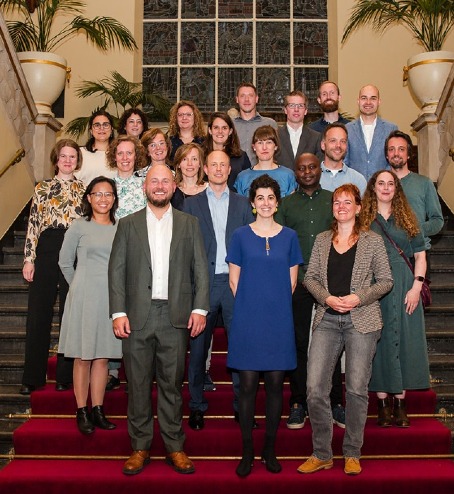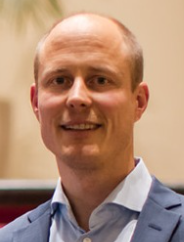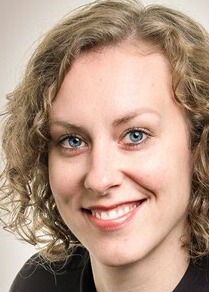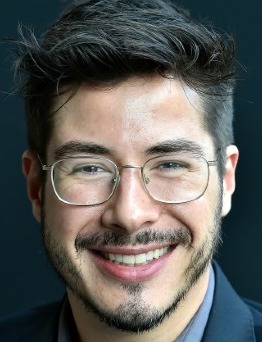How the YAG gives young academics a voice

The Young Academy Groningen (YAG) enters the year of its ninth anniversary. Founded with the aim of being a voice for early-career researchers, it serves as a network for this diverse group within the academic community. It is also a breeding ground for interdisciplinary ideas for research and university policy. Together with similar organizations at other universities and the national Young Academy of the Royal Netherlands Academy of Arts and Sciences (KNAW), they give a voice to a large group of young researchers in these challenging times. Challenges in terms of career prospects, social safety, rights for university lecturers, and impending budget cuts call for attention.
Three YAG board members - Naomi de Ruiter, Lukas Linsi, and Marcos Guimaraes - explain why the YAG is important for the UG, and for the academic world as a whole. Lukas is the chair of the YAG, Naomi focuses on interdisciplinarity, and Marcos focuses on science communication, among other things.

What does the YAG do?
‘The YAG is essentially a lobby group for early-career scientists (ECRs). These young researchers, who obtained their PhDs ten years ago or less, make up a large part of the University but are underrepresented in University bodies,’ Lukas says. ‘The YAG gives a voice to this important group of researchers. We have 35 members; every year seven of them leave, and seven new members join. These researchers are at the forefront of their fields and feel a responsibility to raise issues on behalf of their colleagues.’
Naomi emphasizes the interdisciplinary nature of the YAG. ‘At the YAG, all 11 UG faculties are equally represented, making it a platform where many different disciplines come together. We learn a great deal from one another, not only in terms of research, but also about the policy perspective on academia. The YAG comes up with innovative ideas in the areas of policy and interdisciplinary research projects. This is especially important for young researchers who are eager to broaden their horizon.’
Marcos adds: ‘At the YAG, we are regularly in touch, make interesting connections, and hold discussions. That’s a wonderful thing to see. We also try to share the ECRs’ enthusiasm with the public in the broadest sense through science communication. For example, by giving lectures at Noorderzon Festival and by contributing to the European Researchers’ Night at Forum Groningen, or Zpannend Zernike.’

Why is it important that the YAG exists?
According to Lukas, it is crucial for young researchers to have a voice within the academic world, which is sometimes rather conservative and hierarchical. He explains: ‘Along with other local Young Academies and the national Young Academy, the YAG is part of a movement that can make a difference in the decision-making within academia. YAG members serve as a sounding board for the Board of the University and the Faculty Boards and our input is taken seriously. We look at many issues from a different and 'younger' perspective.’
Marcos sees the significance of the YAG in that it is a learning opportunity for members who might want to pursue a leadership role: ‘Several of our members have taken on positions at the national Young Academy; our alumna Marie-José van Tol was their chair last year, and currently there are even two board members from the UG.’ Former and current YAG members now hold leadership positions within the UG. Lisa Herzog (YAG cohort 2020) is Dean of the Faculty of Philosophy, Ming Cao (YAG cohort 2017) is now the Director of the Jantina Tammes School of Digital Society, and Mladen Popovic (YAG cohort 2016) is Dean of the Faculty of Religion, Culture, and Society. Marcos: ‘It's important to have these alumni in positions where they can make a difference, in part because of their background as YAG member.

Examples of YAG’s successes
Lukas: ‘One initiative the YAG advocated for is the national project Everyone Professor, which resulted in assistant professors and associate professors being give the same rights as full professors when it comes to supervising PhD students (ius promovendi). ‘We believe that the work that early-career researchers put into supervising PhD candidates should be rewarded with not only the obligations but also the same rights,’ says Lukas. ‘However, there are still some hurdles to overcome to get everyone on the same page. For example, the right to wear a gown is still reserved for some supervisors, and Dutch academic job titles are outdated and not in line with global practices.’
‘Within the YAG, we have also initiated innovative and interdisciplinary research projects,’ Naomi adds. ‘These stem from the interdisciplinary PhD tracks that the YAG managed to set up, of which two are available each year. Additionally, several research collaborations have received important grants, something that would have been very challenging or impossible to achieve without the YAG.’ Naomi explains that, ‘these projects have real added value because the life of a researcher can sometimes be lonely. You are focused on your research within your own discipline and faculty, so it is valuable to establish connections with other researchers.’
Marcos refers to the report on harassment in academia that was published in 2021: ‘At the time, members of our diversity and inclusion working group conducted interviews with staff members and former staff members. The Board of the University took the report seriously, and we see that social safety is now also a focal point at the University, although there is always room for improvement. We are committed to keep advocating for that as well.’
What are the challenges and how do you see the future?
‘The academic prospects have not improved with the current Cabinet's intentions,’ laments Lukas. ‘This is perhaps most true for young researchers. It will be a huge challenge to retain young talent if all the plans go ahead.’ Marcos agrees with him: ‘We have colleagues who left because they already saw the storm coming. That results in the loss of a huge wealth of knowledge, because the best researchers always leave first. Gaps are not easily filled. Therefore, as YAG, we will have to make a strong case for retaining talent. In addition, we need to widely promote our status as an internationally excellent University in order to continue to attract talent as well. This is of course already a challenge because Groningen is not located in the middle of the Randstad conurbation.'
Naomi concludes: ‘Here also lies a task for all Young Academies to pull together. We can promote the ideas and passion of the YAG members even better collectively than we already do individually.’
In addition to Lukas Linsi, Naomi de Ruiter, and Marcos Guimaraes, the Board also includes Casper van der Kooi and Christina Englert as the YAG coordinator.
Stay in touch with the Young Academy Groningen?
The Young Academy Groningen aims to be a voice for all early-career researchers at the UG and UMCG. We organize events aimed at young faculty members and postdocs, and we want you to be involved in issues regarding career development, policy, or public engagement. If you would like to join our peer network and stay informed of upcoming activities, please join our mailing list.
We hope to get in touch with you as a member of the early-career researchers’ community at the University of Groningen or as future Young Academy Groningen member!
More news
-
15 September 2025
Successful visit to the UG by Rector of Institut Teknologi Bandung
